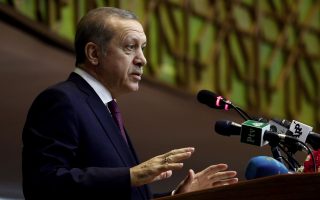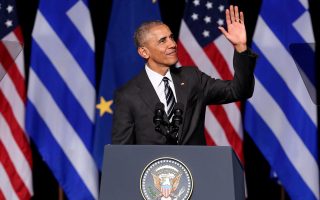Turkey’s revisionist comments

Tensions between Athens and Ankara seem to be bubbling ever more furiously under the surface as a result of Turkish President Recep Tayyip Erdogan’s successive revisionist statements regarding the 1923 Treaty of Lausanne that defined the country’s borders with Europe. By law, the only way for an international treaty to be amended is for all the signatories to agree to it – in this case Greece, Turkey, Britain, France, Romania and Japan – and that is not likely to happen. Therefore, the only course would be a unilateral challenge or violation of the treaty.
All of this, of course, belongs in the realm of theory. In the real world, the fact is that Western forces involved in the war against the Assad regime in Syria are pushing for the establishment of an autonomous Kurdish zone on the Turkish-Syrian border, while at the same time, the fragmentation of Iraq and the creation of such a Kurdish zone is regarded by Ankara as a harbinger of an independent Kurdish state.
The Treaty of Sevres in 1920 foresaw a referendum for the creation of a Kurdish state which included a large chunk of modern Turkey and a part of Mosul in Syria, though this changed entirely after the Asia Minor disaster and was not even mentioned in the Lausanne agreement.
Over the past few years, Ankara has gradually lost its influence south of its borders and is now trying to make up for lost time as it eyes a role in the shaping of the new map in that area. Meanwhile, it is common knowledge that Turkey is going through a period of major instability, both on the domestic and foreign policy fronts, and that Erdogan is an unpredictable, even reckless leader. It comes as no surprise, therefore, that Athens should be concerned by his comments.
Athens, however, should not restrict itself to drawing up theories and analyzing whatever statements are made by Turkish officials. It should be preparing for the worst-case scenario.
So far, with the exception of Greece, none of the nations that signed the Lausanne Treaty have waded into the debate regarding Erdogan’s comments, or altered their foreign policy goals.
So, while Greece’s concerns are well-justified, it runs the risk of turning the situation into an international issue by its constant repetition of Ankara’s statements regarding the minority in Thrace or some Aegean islands. If our political leadership truly believes that Turkey is a threat, then it should be preparing for the worst rather than engaging in a war of words that suggests nothing but insecurity.




